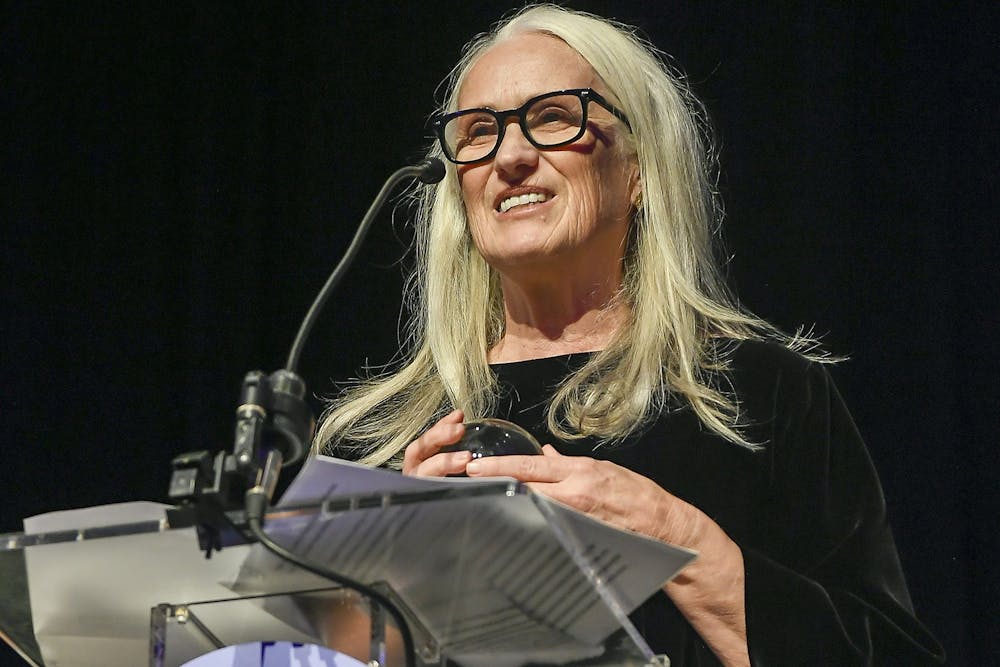There's almost an entire genre of award acceptance speeches that go wrong.
It's always a viral moment, like when Kanye West interrupted Taylor Swift at the 2009 VMAs, or when the wrong movie was announced as the Best Picture winner at the 2017 Academy Awards.
While these events are unfortunate, they are almost always because of some oversight in the production. A wrong card handed to the announcers, security not stopping someone from storming the stage or a plain misunderstanding somewhere down the line.
This wasn't the case with Jane Campion.
Having made waves with her latest film, "The Power of the Dog,” Campion garnered critical acclaim. The film focuses on — among other things — homosexuality in traditional western settings.
Sadly, it was also met with heavy criticism — notably from veteran actor Sam Elliot — who posted a viral, expletive-laden rant about how it was a bastardization of the western cowboy genre. Still, when award season came around, odds were in her favor.
As award season started, one of the first ceremonies was The Critics' Choice Awards, where she won Best Director, competing against the likes of Paul Thomas Anderson, Guillermo del Toro and Steven Spielberg. This wasn't controversial, until she addressed Venus and Serena Williams.
"Venus and Serena, you’re such marvels,” Campion said during her acceptance speech. “However, you don’t play against the guys, like I have to."
This came out of nowhere, as the film "King Richard" — in which the Williams sisters are the subject — wasn't even in the running for this particular category.
While responses from those in attendance were standard, the internet heel-turned from supporting Campion just days earlier to harshly critiquing her tone-deaf comment. Many were quick to point out the Williams sisters actually had competed against men, like the highly televised matches against Karsten Braasch.
Many critics of Campion's speech were also quick to note the racial differences at play, bringing attention to the fact that a white woman had implied her struggle to win Best Director was akin to the careers of two Black sisters who were both professional athletes before they were 18 years old.
While Campion undeniably faces obstacles in the film industry, a male-dominated field, her comments revealed a misguided need to compare her struggles to that of Black women.
Much of her acceptance speech was centered around Campion's womanhood, pointing out the many female individuals among the nominees and winners. There's no problem with this, as it's important to recognize the struggle many female actors, directors and writers face to even be nominated for awards, let alone win them. But she naively overstepped her bounds when she compared her efforts to the Williams sisters.
The issue is in Campion's efforts to bolster her own narrative of a woman director fighting against the odds — which is a good narrative to tell — by comparing it to a completely different struggle. While Campion has faced and still faces oppression from a sexist film industry, the Williams sisters face the same issues on top of the long history of racism they face in their respective careers.
For what it's worth, Campion did eventually apologize.
"I made a thoughtless comment equating what I do in the film world with all that Serena Williams and Venus Williams have achieved. I did not intend to devalue these two legendary Black women and world class athletes,” Campion said, “The fact is the Williams sisters have, actually, squared off against men on the court (and off), and they have both raised the bar and opened doors for what is possible for women in this world."
Still, the whole situation leaves a bitter aftertaste. Though we all undeniably face struggles and opposition in our lives, we must recognize our struggles are not always the same.
Personally, I believe Campion had no ill will in her statement, but the fact remains it was incredibly tone-deaf. She was already winning, and she didn't need to make someone else lose to celebrate her win.






